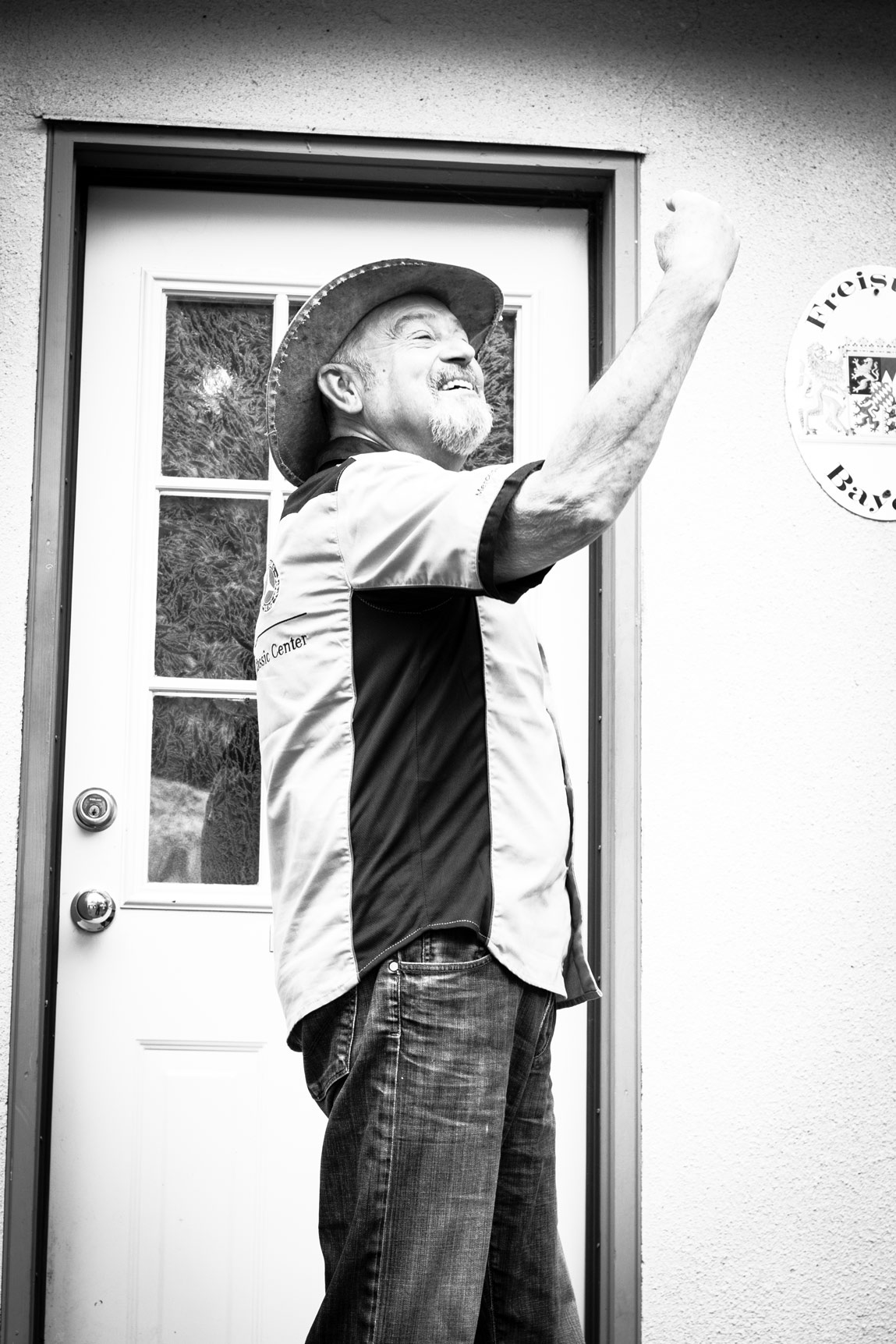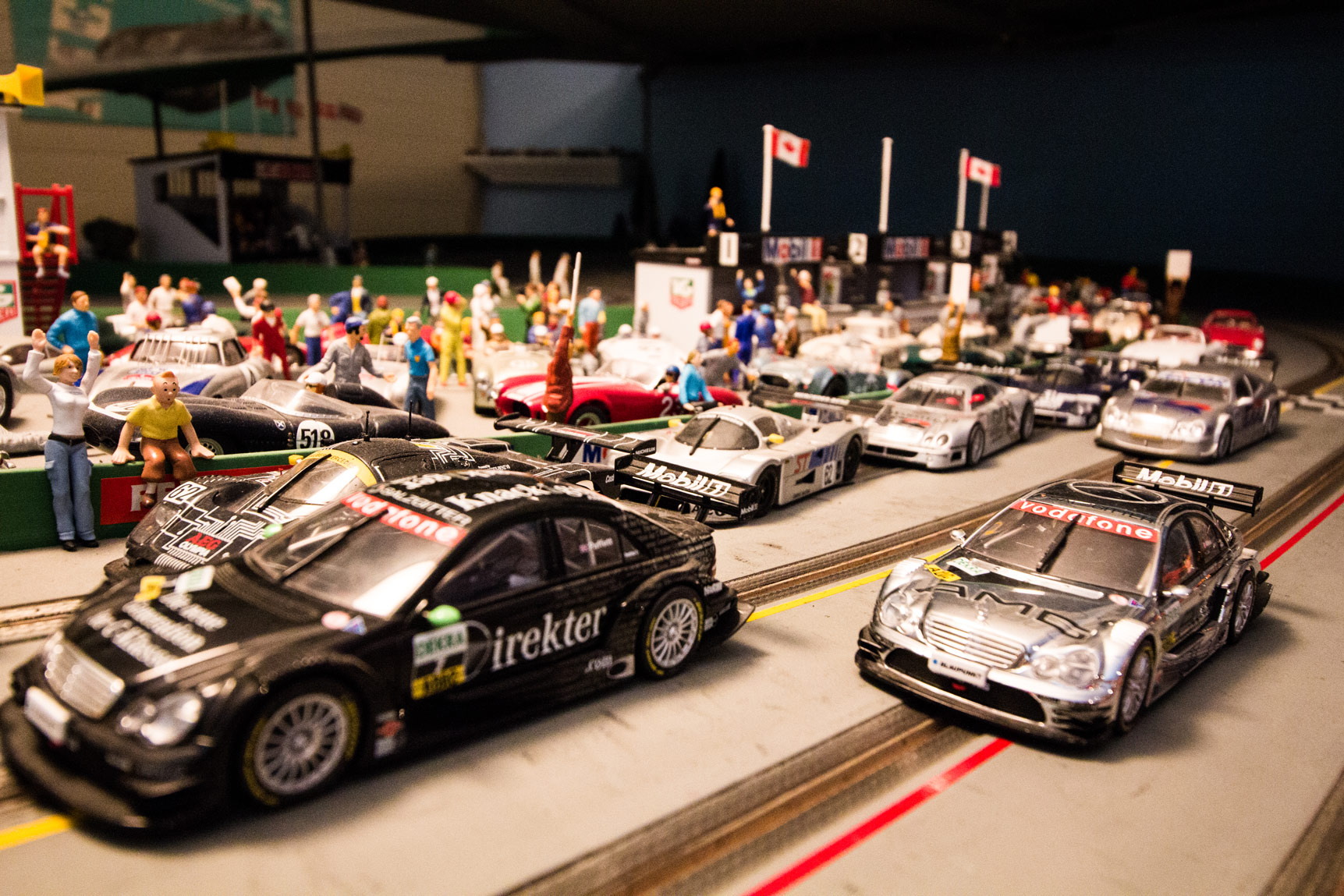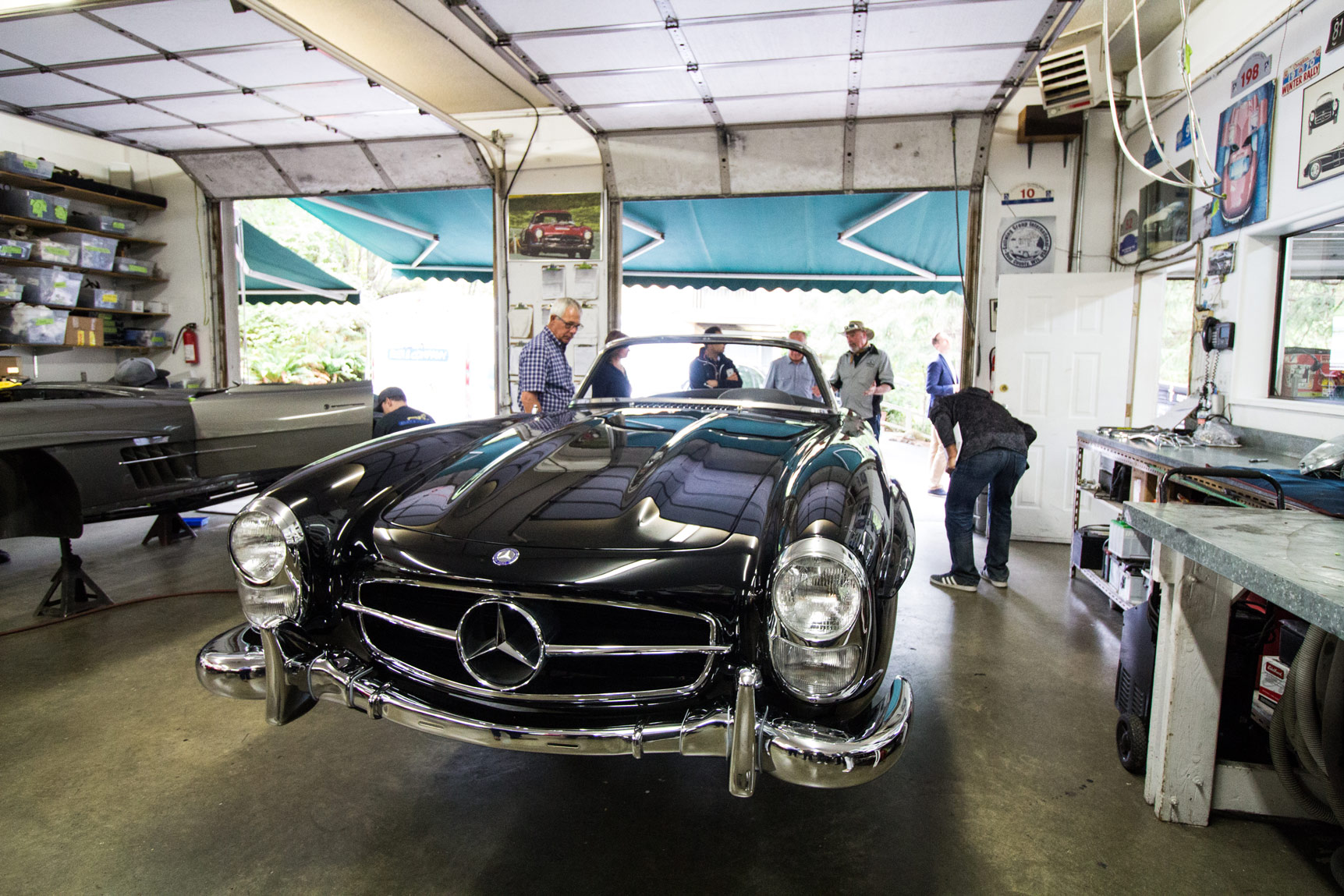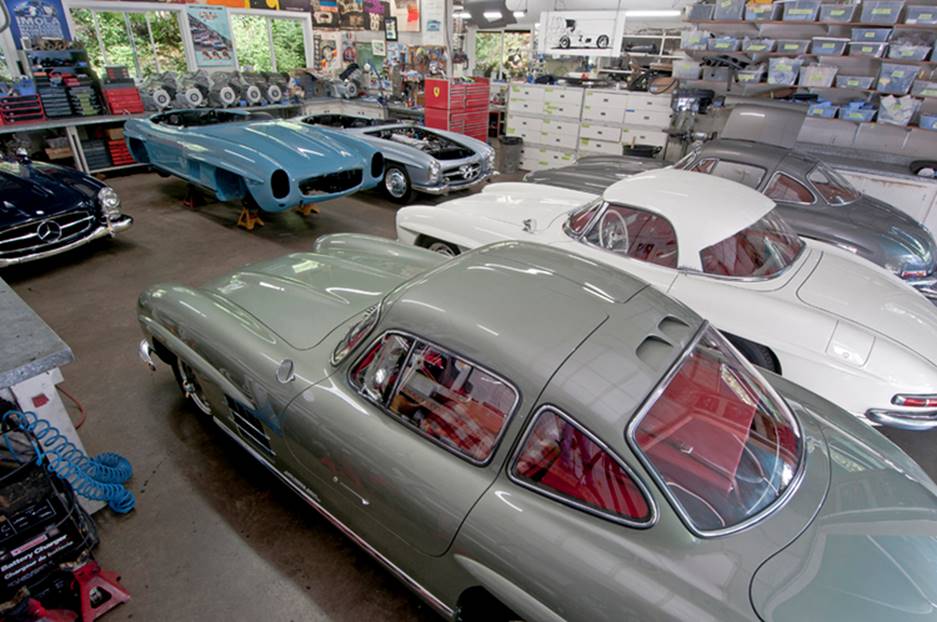 “It’s one of the sexiest things I’d ever seen.” Having completed over 100 restorations of Mercedes-Benz 300SL Gullwings, world-renowned restorer of classic automobiles, Rudi Koniczek, has never lost his passion and enthusiasm for his vocation. Sitting in his casual, comfortable workshop near Victoria, the story of his life, and the history of Rudi & Company, began to unfold.
“It’s one of the sexiest things I’d ever seen.” Having completed over 100 restorations of Mercedes-Benz 300SL Gullwings, world-renowned restorer of classic automobiles, Rudi Koniczek, has never lost his passion and enthusiasm for his vocation. Sitting in his casual, comfortable workshop near Victoria, the story of his life, and the history of Rudi & Company, began to unfold.
Koniczek’s childhood was difficult. Born in Germany, he immigrated to Canada with his family in 1953, settling in Toronto. His German heritage prompted bullying by his classmates. Recalling these experiences provides the foundation for one of the truths that guide his life: “Never hurt anybody, and never be hurt by anybody.
The success that Koniczek enjoys derives from circumstances that affected him at a young age, “I’ve always been an entrepreneur since I can remember. The first entrepreneurial thing I did as a kid was puppet shows for kids. I grew up in the slums of Toronto as an immigrant, no brothers, no sisters, grandparents – never knew them.” Continuing the thought, he stated, “So I always played with my puppets, then I started putting on shows for the kids in the neighbourhood. All of a sudden I started doing puppet shows for birthday parties. I’d bring my little puppet stage and people would pay me to do a puppet show for their kid’s birthday.”
Koniczek’s next job was to prove pivotal in relation to his future. “After that I started working for a hobby shop when I was a kid. Instead of taking money at 25 cents an hour working at the shop after school, on Saturdays and on holidays, I’d take a model car kit the owner would give me, and I’d take the kit home and build it to keep myself entertained. And then I’d bring it back and put it in the window and then, sure enough, someone would walk by and ask whether the model was for sale. I said for sure and, of course, I made more money selling the model car than I could ever make working at 25 cents an hour. There’s another entrepreneurial bit right there.”
 Koniczek’s enthusiasm for the sport was intense. “When I was working for the hobby shop, slot car racing was big in Toronto. And every hobby shop had their own racers and their own tracks and stuff. There were these hobby shops with huge commercial tracks. CHUM-FM would have these races for $100 purse, so I raced slot cars professionally for a hobby shop called Terminal Hobbies. I built the slot cars, tested them on the house track and then I’d race them all over the city. I was very good at it.
Koniczek’s enthusiasm for the sport was intense. “When I was working for the hobby shop, slot car racing was big in Toronto. And every hobby shop had their own racers and their own tracks and stuff. There were these hobby shops with huge commercial tracks. CHUM-FM would have these races for $100 purse, so I raced slot cars professionally for a hobby shop called Terminal Hobbies. I built the slot cars, tested them on the house track and then I’d race them all over the city. I was very good at it.
“I was so proud of what I did and all my slot cars were Mercedes cars. There were Gullwings, roadsters, grand prix cars from the ‘50s, all slot cars that I had built, painted, engineered because they were all scratch built, and I was so proud of my heritage. As a kid I would read books and books about racing cars, racing car drivers. I always wanted to be a racing car driver. (I was) so proud of the achievements that Mercedes-Benz did, and when I saw my first picture of a Gullwing, that was it for me.”
The attention to detail that Koniczek bestowed upon his slot cars became a significant factor in his future career. Knocking on the right door at the right time can present previously unimagined opportunities. Warming to the subject, Koniczek continued, “I decided to, I guess I’m 14 or 15, show the president of Mercedes-Benz Canada what I did. My mom ironed a shirt for me; I told her what I was going to do.”
A bus and subway ride found Koniczek at the Head Office of Mercedes-Benz Canada. Toting his carrying case full of slot cars, tires, and controllers, he presented himself to the receptionist. Asked as to the purpose of his visit, Koniczek boldly replied “I am here to see the President.” Having explained his desire to show the President what he had built, he was invited to take a seat. Following a telephone call, the President’s aide, Dieter Scharf, introduced himself.
“Scharf comes out, attired in a pin-striped suit. He looked like a God. He looked like Adonis. Arian nation chiselled blue eyes, blond hair. Looked like a tank commander. He comes up to me and says ‘You want to see the President?’ I said yes and he asked me why. He said ‘Can I see what you have?’ I put the box on the coffee table and started putting the cars on the table.”
Impressed by what he had seen, Scharf excused himself. Returning some ten minutes later, Koniczek was invited to follow him. “I packed up my cars and walked down this corridor at Mercedes-Benz and in my mind’s eye, I’m envisioning what a corporate office looks like.” Anticipating a collection of books, dark panelling, oak desk with a green leather top, and big leather chairs, he found himself in the precise room.
“It was exactly what I envisioned, although I hadn’t been in a corporate office before. Behind the desk was this very elegant man sitting in the chair, leaning back and smoking a cigarette. Very slowly. He goes, ‘Come here young man and have a seat.’ I took a chair, and Scharf, the aide-de-camp, walks around beside Reiner Lange-Mechlin and, just like a soldier, put his hand behind his back and stamped his foot. ‘Mr. Scharf tells me you have something to show me?’” Maintaining his composure, Koniczek replied, “Yes sir.” Placing the cars on the desk, he explained what he did.
“He’s looking at me and looking at the cars. He picks one up and looks at it, and sees my name painted on the side of it. The driver has a goatee. All my drivers had goatees. He’s blowing his mind, and he asks Mr. Scharf to get the company photographer.
“So Scharff leaves and we start talking and I tell him my history, and then he takes another hit off his cigarette. He says, ‘Young man, tell me what would you like to do in life.’ Without skipping a beat, I said, Mr. Lange-Mechlin, I would like to be sitting where you are sitting.” Upon Scharff’s return, he was issued a new instruction, “Mr.Scharf, give this man a job.” The resulting job as lot boy at Mercedes-Benz Canada marked the beginning of an ongoing 50-year relationship with the brand. Upon finishing school, Koniczek began a full apprenticeship with the company.
Finishing his apprenticeship with Mercedes-Benz, Koniczek received advice from his meister that was to influence the next stage of his life. “I owe it to him. Part of my journey I owe to him. His name is Josef Dunjko. I’d work with him. One day sitting on the work bench there was a 300 SL in the bay with him, and we were working on the car and having lunch. He pulls out his lunch box and opens it up, and opens his thermos, and pulls out his sandwich. We’re just talking and he says, ‘You know, I want you to run away from this place.’”
 Not surprisingly, the conversation took Koniczek by surprise. Asking “Why?” provided a thoughtful answer. Dunjko explained, “If you don’t run away from this place, you’ll end up like me. Sitting here when you’re my age, eating your lunch out of a box where your ass belongs to the company, your ass doesn’t belong to you anymore. You are destined for greater things. You have natural ability. Don’t waste it here.” Because of the respect held for his mentors, Koniczek left Mercedes-Benz after five years and, moving to Victoria, BC, opened his own shop.
Not surprisingly, the conversation took Koniczek by surprise. Asking “Why?” provided a thoughtful answer. Dunjko explained, “If you don’t run away from this place, you’ll end up like me. Sitting here when you’re my age, eating your lunch out of a box where your ass belongs to the company, your ass doesn’t belong to you anymore. You are destined for greater things. You have natural ability. Don’t waste it here.” Because of the respect held for his mentors, Koniczek left Mercedes-Benz after five years and, moving to Victoria, BC, opened his own shop.
Membership with the Victoria Motorsport Club soon followed. By helping to organize rallies, and in preparing rally cars and race cars, Pacific Competition Developments quickly earned a reputation for excellence.
“I sold it (Pacific Competition Developments) about four years after that because I was getting busy with Mercedes-Benz clients and Rolls-Royce clients.” After an interim move, the new company, Autohaus, opened in a stylish shop in Oak Bay. “I found this place built in the 20s, loved the building, loved the romance and I also had a captive audience because that’s where all my clients were now.” With the support of Charlie DePape, a successful purveyor of luxury and sporting cars, Autohaus became one of the busiest independent repair shops on Vancouver Island.
While Autohaus was successful, Koniczek ultimately wasn’t content. “I came to the conclusion after about 15 years that the business was running me, and I wasn’t running the business anymore. It was getting too busy and it wasn’t fun anymore.”
Having sold Autohaus, and recognizing that retiring at 40 years old would result in his being bored, Koniczek decide to follow his heart. “I went back to my roots. What got me into Mercedes-Benz in the first place ̶ working on nothing but 300SLs.”

He started again in warehouses purchased on Vanalman Avenue. The resulting company, Victoria Carriage Company, was to eventually morph into Rudi & Company. The philosophy behind the company is quite simple, “It’s an art form. And all we’re doing is restoring automotive art. For future generations, for my grandchildren … you’ve seen the writing on the wall. These cars are museum pieces. Everything now is so forgettable.”
Once a car arrives at Rudi & Company, the tear-down begins. Depending on the condition of the vehicle, a full restoration can take up to 18 months at a cost of about $300,000.
Gooding & Company, a premier international auction house, recently sold a special light-weight 300SL that had passed through Koniczek’s care. Having been discovered in a rat-infested garage in California, the pre-sale estimate was shattered, with the car realizing $4.62 million US when the bidding ended.
 “Rudi has gained a reputation for quality craftsmanship and integrity. His business stems from a distinct passion for the cars, which is abundantly present in each finished project,” says Gooding & Company specialist Paul Hageman, who adds that Koniczek is widely regarded as a leading expert in the 300SL.
“Rudi has gained a reputation for quality craftsmanship and integrity. His business stems from a distinct passion for the cars, which is abundantly present in each finished project,” says Gooding & Company specialist Paul Hageman, who adds that Koniczek is widely regarded as a leading expert in the 300SL.
The most important thing he can pass on, says Koniczek, is his passion for life, particularly in relation to young people. Since the early 1970s, Koniczek has welcomed students doing work experience into his shop. Two have made a career with Koniczek, working with him over 20 years. Students who go elsewhere are offered Koniczek’s help in finding the career that will best suit them, as whatever they do should “not be a job but a lifestyle,” he says. The company’s newest member exemplifies this belief. Realizing in his mid-40s that his career as a respected CPA wasn’t fulfilling, and having accrued skills completing his own restoration projects, he wrote to Koniczek looking for a job. So compelling was the attached resume, he is now just over a month into his new career with Rudi & Company.
Vancouver Island’s GAIN Dealer Group is a dynamic and forward thinking company. Representing Audi, BMW, MINI, Porsche, smart, Subaru, Volkswagen, and Mercedes-Benz, it isn’t surprising that the two companies have much in common. GAIN is developing the Vancouver Island Motorsport Circuit, in the beautiful Cowichan Valley. The circuit will provide members and clients the opportunity to enjoy their sports cars without encumbrance, within a controlled environment.
Respecting the mind-set behind GAIN, Koniczek finds himself beginning a new chapter in his life.
“I really welcome being associated with GAIN. I feel it’s a wonderful collaboration in the journey of classic cars. Because of the track (Vancouver Island Motorsport Circuit), it’s wonderful that I’ve resurrected what I started with in this town, with Pacific Competition Developments. Six months ago I thought I’d see if anyone had that name, my old shop’s name. And of course nobody did, so I have it again! It’s back to life. Pacific Competition Developments, hopefully, is to be the vintage arm of motorsport at GAIN.
“We’ll be looking after the clients’ cars that modern mechanics or technicians don’t understand. I don’t know anything about modern day cars, other than that I own some. A lot of the modern technicians don’t know how to adjust the valves or carburettors or mechanical fuel injections, real mechanical components, because cars today are more computerized than mechanical,” says Koniczek.
“We’re enthusiasts first. Number one, Rudi Konicek is an enthusiast first. And is driven, not by money, but by passion. Not just passion for what we do, but for doing it well.”
The success Koniczek enjoys has been earned, as a result of respecting the ideals of integrity, mentorship, kindness and passion.
“If I can send that message out to anybody who is going to read what you are going to write, be a positive influence; it’s too easy to be negative. My cup is always half full, not half empty. Too many people are half empty. Change it. I like laughter! I like being goofy! Some people think I’m crazy. But that’s okay, because you can’t please everybody, but you can please yourself. That’s what I’ve done. I’ve just been blessed with everyone who has entered my life. And you open up yourself to good karma. You put out good energy and you get that energy back tenfold. And when you least expect it, something enters your life and you go ̶ how did that happen? It’s a little guardian angel.”

Close